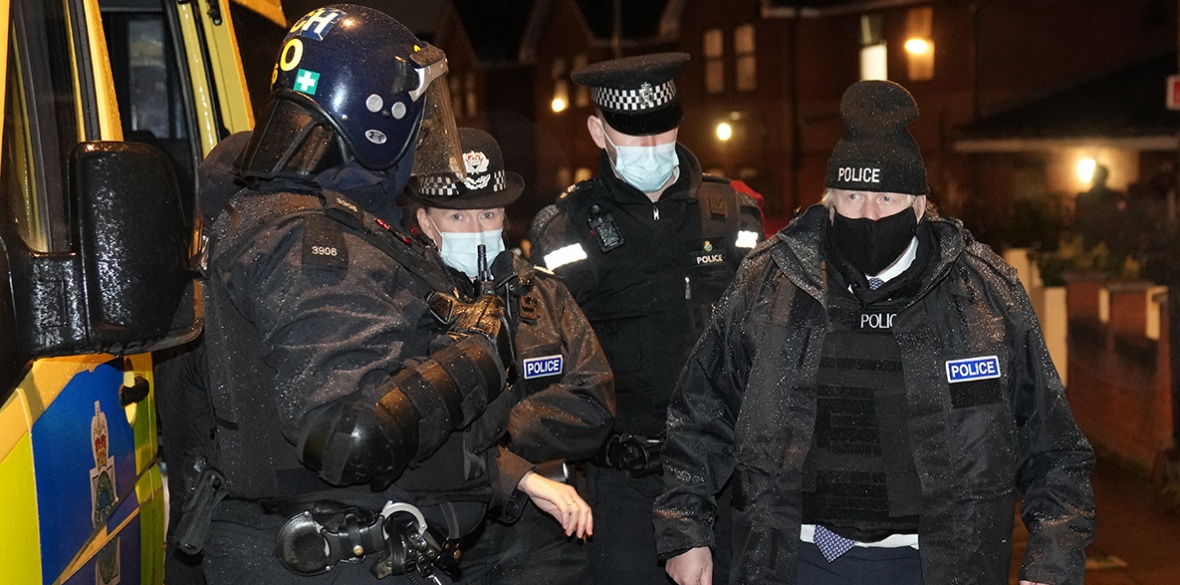This is the last article you can read this month
You can read more article this month
You can read more articles this month
Sorry your limit is up for this month
Reset on:
Please help support the Morning Star by subscribing here
THE government has been accused of doubling down on failed war on drugs-era policies after pledging a crackdown on dealers and users.
Unveiling the government’s 10-year drug strategy yesterday, Prime Minister Boris Johnson vowed to “come down hard” on drug gangs who are “making hell of people’s lives.”
The strategy commits to a £300 million crackdown to dismantle more than 2,000 county lines, while also proposing new penalties to target middle-class drug users by confiscating passports and driving licences.
Mr Johnson argued yesterday that the latter measure was aimed at drug users who are fuelling exploitation through generating demand, but campaigners condemned the policy, saying that it “belongs to the authoritarian playbook.”
Alongside the crackdown, the strategy also proposes increased investment in drug treatment in an attempt to break the cycle of addiction for heroin and crack users and repeat offending.
While this shift from punishment to healthcare was welcomed, campaigners warned that other measures targeting dealers and users would undermine the government’s proposed treatment efforts and repeat the same failed “war on drug” policies.
“Whilst the full details of the strategy have not yet emerged, the government’s new strategy appears to be rehashing the ‘war on drugs’ rhetoric that has plagued the UK for the last 50 years,” said Dr Laura Garius, policy lead at drug reform campaign group Release.
“The war on drugs is, in reality, a war on people living in poverty and a war on people from black and brown communities,” she said, referring to policies instigated in the United States in the 1970s by President Richard Nixon’s administration.
“This new strategy does not appear to go far enough to reduce the record high drug-related death rates and the entrenched racial and social injustice caused by drug law enforcement.”
Drug reform groups have long argued that punitive drug policies have failed to curb drug use while fuelling violent crime and disproportionately targeting communities of colour.
Martin Powell, of Transform Drug Policy Foundation, said it was a shame that the government had “wrapped up some sensible, grown-up approaches to drugs in a cloak of gung-ho drug war nonsense.”
He said: “Doubling down on enforcement-led drug policies that have failed for over 50 years and directly led to the current catastrophic levels of drug deaths, record levels of drug availability and strength and empowerment of organised crime is not the answer.”
Other campaigners noted that Britain’s strategy stood in stark contrast to other countries pushing for legalisation and decriminalisation, such as Germany, Canada and Portugal.
International Drug Policy Consortium executive director Ann Fordham said the strategy “flies in the face of UN guidance that drug use should be decriminalised to uphold health and human rights.
“Increased drug policing will do nothing to deter a resilient and buoyant market. But it will certainly harm poor and racialised communities already bearing the brunt of police violence.”
Ms Fordham added that “unevidenced” measures to remove passports for drug offences “belong to the authoritarian playbook, not to a human rights and health-based approach to drug policy.”
The strategy was unveiled ahead of an international call by 26 leading public figures, including 14 former world leaders, for a radical overhaul of international drug policy, including the legalisation of all banned narcotics.
Today’s report by the Global Commission on Drug Policy argues that prohibition marginalises and violates the rights of people who use drugs, perpetuates systemic racism, drives violence and over-burdens criminal justice systems.
Commenting on Britain’s new drug strategy, Commission chairwoman Helen Clark, a former prime minister of New Zealand, said that the proposals largely “double down on the rhetoric and policies of the failed war on drugs.”
She added that legalising and regulating all drugs was the only approach that “would help to take power out of the hands of criminals, reduce violence and ensure users get the help and support they need.”
The government’s tough approach to so-called “lifestyle drug users” coincides with Westminster facing calls for an investigation into “rife” cocaine use by MPs.
Commons Speaker Sir Lindsay Hoyle promised this week to raise allegations of drug use in Parliament with the Metropolitan Police after an investigation found traces of cocaine in several lavatory areas.
Labour claimed that government cuts to criminal justice spending over the past 10 years had created the problems that the drugs strategy seeks to fix.
Labour MP Nadia Whittome also criticised the measures, accusing ministers of "boasting about their class A drug use at uni, while criminalising teenagers in my community dealing weed.
"Now it is turbo-charging the war on drugs. This won’t work and will continue to wreck lives,” she added.
While Coventry South MP Zarah Sultana warned: “When Boris Johnson ramps up the failed ‘War on Drugs’, remember it's not people like him, Michael Gove, or other Conservative MPs who have admitted to taking class A drugs that will be worst affected by it - it will be working class black and brown people.”
 Bethany Rielly
Bethany Rielly








